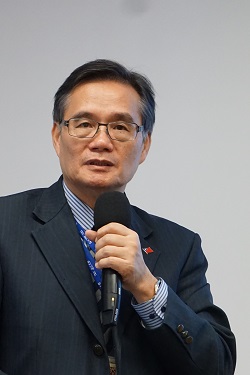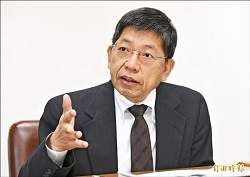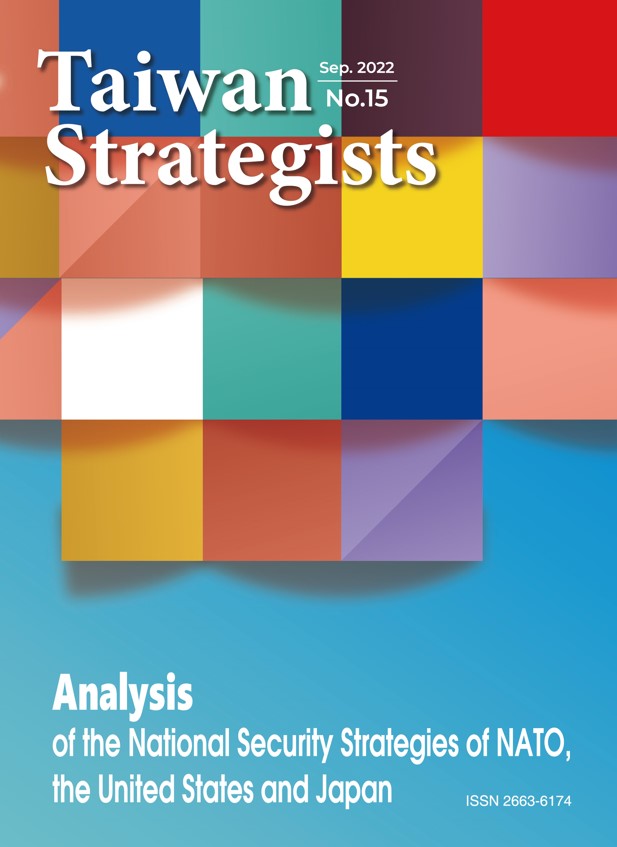Taiwan Strategists No. 15
NATO’s 2022 Strategic Concept and Its Impact on Global Security
Ming-hsien Wong
Professor & Director, Graduate Institute of International Affairs and Strategic Studies,
Tamkang University
Abstract
The Russian invasion of Ukraine has revealed the importance of NATO’s 2022 Strategic Concept and its contribution to the Euro-Atlantic peace and security. This paper analyzes the three previous NATO strategic concepts and their different security concerns, the security environment and the means to response to such issues. In the past versions of the document, NATO first regarded the Soviet Union, and then non- traditional security threats, as the main challenges for NATO member-states; after Russia-Ukraine war, however, Moskva has emerged as the most significant and direct threat, while China is regarded as posing a systemic threat. How to prevent Russia- China strategic cooperation from upending the global security order will be the most important task for the U.S.-led Euro-Atlantic and Indo-Pacific partnership.
This paper first examines NATO’s three previous strategic documents: “The Alliance’s New Strategic Concept” (1991), “The Alliance’s Strategic Concept” (1999) and “Active Engagement, Modern Defence” (2010) in order to better understand the different factors that impacted Euro-Atlantic security. It then analyzes the origins and content of the “NATO 2022 strategic concept” how China and Russia to react to this new strategic concept. Lastly, the paper discusses the importance of the new strategic concept and future potential countermeasures from China and Russia. It also looks at how Taiwan can seize this juncture to enhance its connectivity with NATO.
Keywords: NATO 2022 Strategic Concept, Global Security, Russia-Ukraine War, Russia, China
U.S. National Security Strategy and the Biden Administration’s Challenges in the Indo-Pacific
Cheng-yi Lin
Research Fellow, Institute of European and American Studies,
Academia Sinica
Abstract The Biden administration has greatly improved U.S. international leadership through various multilateral initiatives in the Indo-Pacific region. And yet, despite those achievements, the U.S. needs to tackle a number of hurdles. India and ASEAN are wary of taking a pro-U.S. defense posture. The Ukrainian War and the changing security dynamics in Europe have made it more difficult for China to collaborate with Europe to ease the pressure from the United States. The war has also weakened U.S. overall preparations for the consolidation of an Indo-Pacific Strategy. The U.S. and China have intensified their competition in the Indo-Pacific and the complex relations of two great powers are the most difficult to manage when it comes to Taiwan. President Biden’s security commitments to Taiwan come at a critical juncture after the crisis in August 2022, which suggests that Taiwan may become the real test for Biden’s Indo-Pacific Strategy.
Keywords: National Security, Indo-Pacific Strategy, U.S.-China Relations, Quad, Taiwan Security
Constitutional Reform and Taiwan-Japan Relations in the Post-Abe Era
Tony Tai-ting Liu
Assistant Professor,
Center for General Education,
National Chung Hsing University
Abstract
The unexpected death of former Japanese Prime Minister Abe Shinzo marked the end of an era in Japan that witnessed the country expending great efforts to maintain its leadership status in the Indo-Pacific. Abe had provided leadership for the nation at a tumultuous time and left behind rich legacies as the longest serving prime minister in Japanese history. The bolstering of Taiwan-Japan relations and constitutional reform leading to an expansion of the contexts to use military force are two legacies that stand out among others. Noting increased tensions in the Taiwan Strait, particularly after U.S. House Speaker Nancy Pelosi’s visit to Taiwan, the significance of Abe’s work needs little elaboration. This article looks back at constitutional reform related to collective security under the Abe government and recent developments in Taiwan-Japan relations, before considering how Japan’s security perception of the Taiwan Strait would implicate the development of Taiwan-Japan relations. It suggests that Japan’s stance towards developments in the Taiwan Strait is a key factor that will influence the development of relations between Taiwan and Japan in the post-Abe period.
Keywords: Constitutional Reform, Collective Security, Taiwan-Japan Relations, Taiwan Strait, Post-Abe Period




